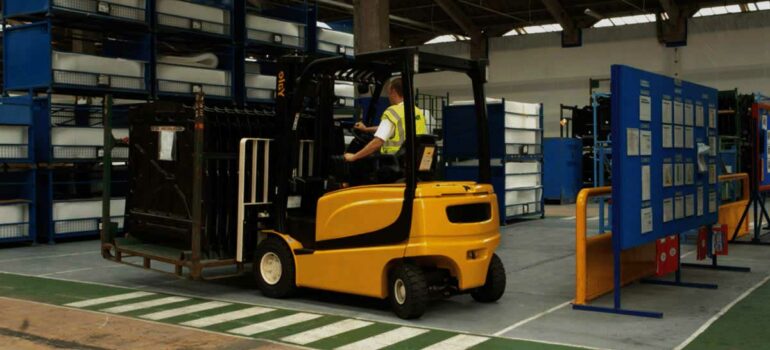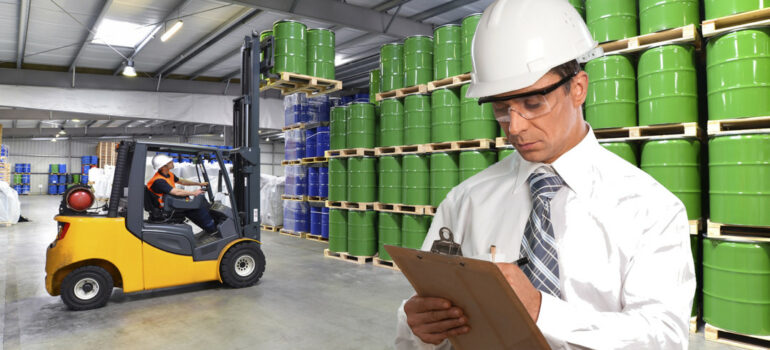Everything You Need to Know About Forklifts Before Joining Forklift Training in Toronto
Forklifts play a crucial role in various industries, facilitating the movement and transportation of heavy loads with ease. However, operating a forklift requires specialized skills to ensure safety and efficiency in the workplace. If you are considering joining a forklift training program in Toronto, it is essential to familiarize yourself with the basics of forklifts and the training process. In this guide, we will cover everything you need to know about forklifts before enrolling in Forklift Training Courses Toronto.
Understanding Forklifts
Before delving into forklift training, it is important to have a basic understanding of what a forklift is and how it functions. A forklift, also known as a lift truck, is a powered industrial truck equipped with forks at the front to lift and transport heavy materials. These versatile machines come in various types, including counterbalance forklifts, reach trucks, and pallet jacks, each designed for specific applications.
Key Components of a Forklift
- Mast: The vertical assembly that raises and lowers the load.
- Forks: The arms that lift and carry loads.
- Cab: The compartment where the operator sits and controls the forklift.
- Tires: Forklifts can have either cushion or pneumatic tires, depending on the application.
- Counterweight: Located at the rear of the forklift, it counterbalances the weight of the load.
Forklift Training Toronto
Now that you have a basic understanding of forklifts, let us explore the forklift training process in Toronto.
- Legal Requirements: Operating a forklift requires compliance with safety regulations and legal requirements. Forklift operators in Toronto must undergo training to meet the standards set by regulatory bodies. Look for accredited training programs that adhere to the Occupational Health and Safety Act.
- Choosing the Right Training Program: When selecting a forklift training course in Toronto, consider factors such as the training provider’s reputation, course duration, and the types of forklifts covered. Look for programs that offer hands-on training, classroom instruction, and practical assessments.
- Theory and Practical Training: Forklift training typically includes both theoretical and practical components. The theoretical aspect covers topics such as forklift safety, regulations, and operating principles. Practical training involves hands-on experience with operating a forklift in a controlled environment.
- Duration of Training: The duration of forklift training courses in Toronto can vary. Shorter courses may cover the basics, while longer programs provide more in-depth knowledge and practical experience. Choose a course that aligns with your learning goals and the specific type of forklift you will be operating.
- Certification: Upon successful completion of the forklift training program, participants receive a certification, indicating their competence in operating a forklift. This certification is often a prerequisite for employment in industries that use forklifts.
Safety Considerations
Safety is paramount when operating a forklift, and comprehensive training is crucial to prevent accidents and injuries. Here are some key safety considerations:
- Load Capacity: Understanding the load capacity of the forklift is essential. Exceeding the specified load limit can lead to instability and accidents.
- Stability: Forklifts have a specific center of gravity, and operators must be aware of this to prevent tip-overs. This is especially important when navigating ramps, uneven surfaces, or carrying an elevated load.
- Pedestrian Safety: Forklift operators should be trained to be aware of their surroundings, especially in areas where pedestrians are present. Clear communication and designated pathways help prevent accidents.
- Maintenance Checks: Regular maintenance checks are vital to ensure the forklift is in proper working condition. Faulty brakes, steering, or other components can lead to accidents.
- Proper Loading and Unloading: Properly securing and balancing loads are critical to prevent accidents during loading and unloading processes. Forklift operators should be trained in proper handling techniques.
Advanced Forklift Training and Continuing Education
Beyond the foundational forklift training, operators can benefit from advanced courses that enhance their skills and open up opportunities for career growth. In Toronto, several training programs offer specialized courses tailored to specific industries or for operating advanced forklift models. These advanced courses cover topics such as high-level stacking, narrow aisle operation, and specialized attachments, providing a more comprehensive skill set for operators.
Continuous education is essential in the fast-evolving industrial landscape. Forklift technology and safety standards are constantly improving, and operators must stay updated on the latest advancements. Some training programs offer refresher courses to ensure that operators remain knowledgeable about changes in regulations and best practices. Staying current with industry standards not only promotes safety but also demonstrates a commitment to professionalism and excellence in forklift operation.
Additionally, operators can explore opportunities for specialization in niche areas such as cold storage operations, hazardous material handling, or construction site logistics. Specialized certifications in these areas can significantly boost an operator’s marketability and open doors to unique job opportunities in various sectors.
Employability and Career Advancement
Completing forklift training in Toronto not only equips individuals with the skills needed to operate these powerful machines but also enhances their employability. Many industries, including manufacturing, logistics, and construction, actively seek certified forklift operators to ensure the safe and efficient movement of materials within their operations.
Moreover, possessing a forklift certification can lead to better career prospects and increased earning potential. Many employers prioritize hiring operators with proper training, and having a certification often sets individuals apart in a competitive job market. As industries continue to recognize the importance of skilled forklift operators, the demand for certified professionals is expected to rise.
Conclusion
Joining Forklift Training Toronto courses is a significant step towards becoming a skilled and responsible forklift operator. Understanding the basics of forklifts, choosing the right training program, and prioritizing safety are key factors in a successful forklift training journey. By gaining the necessary knowledge and skills, you not only enhance your employability but also contribute to a safer and more efficient workplace. Invest in your future by enrolling in a reputable forklift training program and mastering the art of forklift operation in Toronto.


